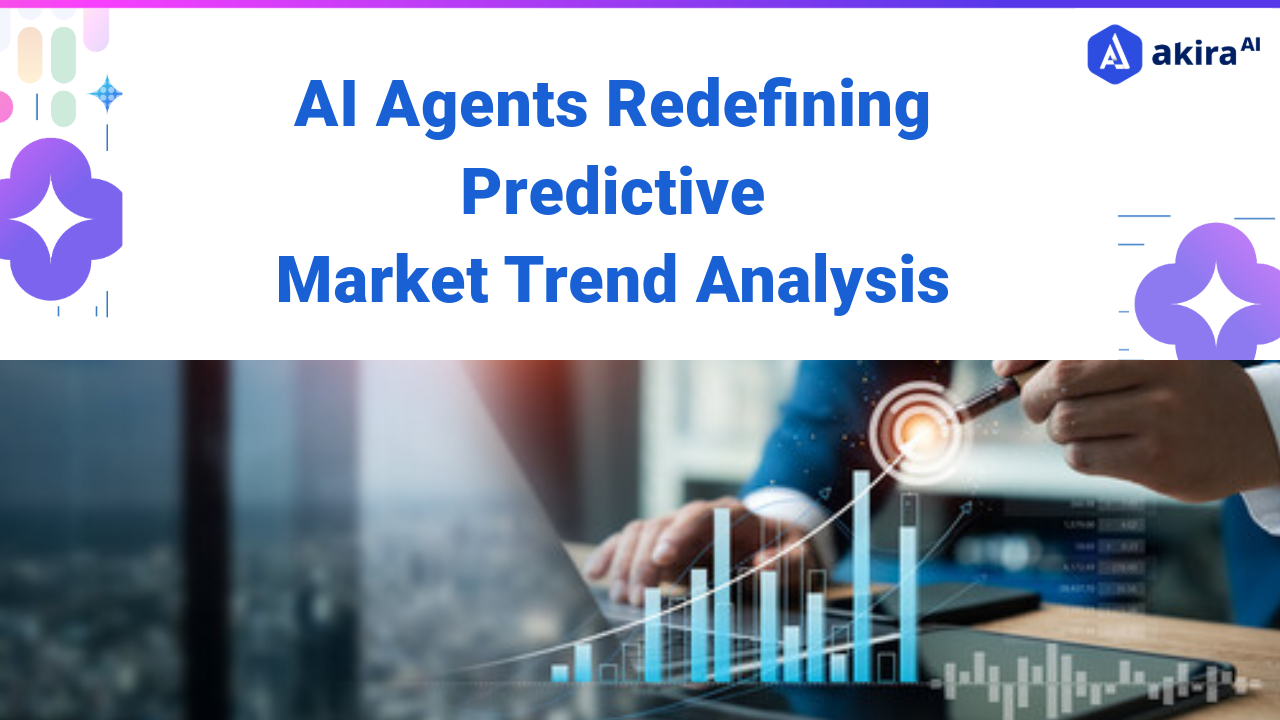Reporting financial data is one of the fundamental management processes in every organization, but the processes encompassed within it tend to be very tedious and error-prone. Thankfully, steady progress is being made in artificial intelligence, altering the situation. To help customers like financial institutions, Akira AI can effectively automate reporting so that the final output is faster and more accurate. This blog post looks into the place of AI agents in financial reporting, traditional financial reporting, and modern ones based on the application of cutting-edge technology, and it includes a long list of advantages of resorting to the modern way.
What is Financial Report Generation?
Financial report generation is the process of compiling economic documents that present structured information on an organization's performance and state at a particular time. In this case, these reports assist the management as they provide them with a vital tool for ascertaining the health and performance of the firm concerning the needs of the investor, the regulator, and the analyst.
A Brief Overview of AI Agents in Automated Financial Report Generation
Artificial intelligence agents are sophisticated computations used in completing tasks that people have to perform. From the feature financial reporting perspective, the agents can obtain information from other sources, process the information, look for some patterns, and prepare a report according to the timetable. They use vast data and profound analytical methods, so they produce specific information that is not visible and the scalability and flexibility in the approach to reporting.
In banking, automated financial reporting involves the use of AI and ML technologies to prepare financial documents with little or no input from human beings. This new way refers to the gathering, processing, and reporting of information that could be in a simple and applicable form for the stakeholders like the investors, the regulatory authorities, and the internal directing groups. It helps banks and institutions produce reports faster and more accurately and ensures better decision-making capabilities and operational effectiveness. Since the marketplace has evolved towards becoming more complex, financial institutions are in a position to harness new technologies, which will enable them to remain relevant within the market.
Traditional vs. AI-Driven Financial Report Generation
|
Aspect |
Traditional Financial Reporting |
Agentic AI-Based Report Generation |
|
Process |
Manual data entry and compilation |
Automated data collection and report generation |
|
Speed |
Can take days or weeks to finalize reports |
Generates reports in minutes |
|
Human Intervention |
High reliance on human expertise |
Minimal human intervention |
|
Error Rate |
Prone to human errors during data entry and analysis |
Significantly reduces errors through automation |
|
Data Sources |
Limited to predefined sources and manual inputs |
Integrates data from multiple internal and external sources |
|
Analysis |
Basic analysis, often conducted manually |
Advanced data analysis using algorithms and ML techniques |
|
Real-Time Updates |
Reports are static until manually updated |
Provides real-time updates as new data becomes available |
|
Scalability |
Difficult to scale with increasing data volume |
Easily scalable to handle growing data and reporting needs |
|
Compliance |
Manual checks for compliance, prone to oversight |
Automated compliance checks integrated into reporting |
How Do AI Agents Facilitate Automated Financial Report Generation?
AI agents play a pivotal role in streamlining and enhancing the financial reporting process through several vital functions:
-
Automated Data Gathering: In addition to retrieving data from other databases, AI agents are capable of retrieving data from financial systems, market feeds, and regulatory databases and converting them for analysis. Such automation eliminates the remittance of data and other related inflows that are time-consuming and reduces errors involved in the process.
-
Comprehensive Data Analysis: After the data is collected, these agents analyze it using sophisticated algorithms to identify any patterns, trends, or variations within that data. They conduct an elaborate analysis that reveals features that may need to be fully seen through other techniques and assist institutions in improving their decisions.
-
Dynamic Report Creation: Based on the data analysis, the AI agents can generate various reports in PDF, dashboard, and intelligent visualization forms. Because the information base is highly flexible, stakeholders can obtain the desired information for analysis most suitably.
-
Instantaneous Updates: A key advantage of AI agents is their capability to provide real-time updates. Due to the high efficiency of automated report writing, new material can be included in the document right away, and key decision-makers will be equipped with the most recent data.
Optimizing Financial Report Generation with Akira AI
-
Akira AI’s platform employs intelligent agents, which improve the speed and accuracy of financial report production. Thus, each agent has its role and function, and the agents work in combination in order to minimize the management efforts in the process.
-
Data Collection Agents: These agents can also obtain information from other sources like financial systems, market feeds and regulatory databases. It helps reduce many manually entered errors and ensure the data collected is accurate and up to date at the same time. It is a fundamental stage that defines data collection and, therefore, report generation processes.
-
Analysis Agents: Once the data is gathered, specialized analysis agents employ advanced algorithms to uncover trends, patterns, and anomalies within the information. By providing deep analytical insights, these agents enable organizations to assess their financial performance and make informed decisions based on real-time data. This capability is essential for adapting to market dynamics and internal changes.
-
Reporting Agents: Following the analysis phase, reporting agents are solely responsible for the generation of financial documents in PDFs, dashboards, and so on. Thus, a primary focus on the clear and simple presentation of the relevant information helps stakeholders interpret it when needed. This offers a clear and explicable structure for communication as well as decision-making processes.
-
Real-Time Update Agents: These agents monitor new data feeds and modify the reports as soon as fresh data are received into their system. This functionality ensures that market information relevant to decision-making is passed to stakeholders on time to address changes in the market and meet organizational needs.
-
Compliance Agents: Focusing on regulatory adherence, compliance agents ensure that all generated reports meet relevant legal requirements. They can automatically adjust report formats and content to align with evolving standards, reducing the risk of non-compliance. This proactive approach fosters a culture of accountability and transparency within organizations.
Use Cases of AI Agents in Financial Report Generation .jpeg?width=1920&height=1080&name=image%20(4).jpeg)
Fig 1: Use Cases of AI Agents in Finance Report Generation
In terms of financial report generation, AI agents have numerous use cases.
-
Regulatory Reporting: Efficiency of reports requires the use of smart systems that gather, compile, and present necessary information, and this cuts the time required greatly, besides increasing reliability. The real-time generation of reports also helps in the timely submission of the reports, hence reducing the chances of penalties for late submission. Further, organizations can learn to change their regulations and enhance their transparency level.
-
Performance Analysis: Advanced calculations make micro-analysis possible by sequencing the company's finance ratios over a given period to get trends and performance markers. To historical data, organizations get an idea of revenue generation and controlling costs. Such information assists in measuring today's performance and establishes a reference point that organizations provide for improvements tomorrow.
-
Risk Management: Technological progress dedicated to risk management aims at searching for possible financial risks related to such conditions as market fluctuations, credit risks etc. There is awareness of the risks to the finite financial resources that numerous organizations require for their work by identifying the data patterns. In addition, predictive modeling can identify particular practices that can eliminate or at least reduce the chance of a risk occurring.
-
Budgeting and Forecasting: Budgeting and forecasting are refined by using most of the historical data and up-to-date market analysis to develop sound financial plans. Determining how money is being spent means that an organization can marshal resources in a strategic manner. It helps with the planning and procurement of future revenues to assist with proper competent preparation.
-
Client Reporting: Better client reporting enhances the production of specific reports on the particular customer’s portfolio and respective investments. The above approach improves communication, hence building client satisfaction due to increased trust. By being informative, organizations enhance relationships with clients and make them more loyal.
-
Market Analysis: Comprehensive market analysis employs intelligent technologies to evaluate trends, competitor performance, and economic indicators to identify investment opportunities. Extensive data analysis is useful in strategy and acting on an organization's portfolio. This leads to the ability of institutions to effectively counter market dynamics and exploit gains-worthy prospects.
-
Operational Efficiency Reports: Smart solutions create reports assessing departmental performance by analyzing workflow data and resource allocation. Coordination gaps make it possible for organizations to start optimizing endeavor balances to provide direction on where and when to make improvements. These reports, therefore, contribute to the realization of cost control and organizational function from the standpoint of productivity improvement.
-
Profitability Analysis: Analytical profitability techniques uncover revenues and costs at the product level or region to determine where organizations can make the most money. This insight is used to determine the right investment strategies and resource management. Profit volatility analysis also helps modify the development of tariffs and upcoming promotions.
-
Fraud Detection and Reporting: Continuous monitoring of transactions through advanced technologies allows for the detection of unusual patterns that may indicate fraud. Sophisticated systems facilitate real-time anomaly identification, enabling swift responses to potential threats. This proactive approach enhances security and protects the organization's financial integrity.
-
ESG Reporting: Generating Environmental, Social, and Governance (ESG) reports evaluate a company's commitment to sustainability and social responsibility. Analyzing relevant data provides insights important to investors and stakeholders. These reports help organizations demonstrate their sustainability efforts and meet the growing demand for transparency.
Operational Benefits of AI Agents in Financial Reporting
-
Increased Efficiency: Automation dramatically reduces the time it takes to produce financial reports. As a result, a lot of time is saved from tasks that may involve more thinking or outright creativity. Using automation to generate financial reports takes less time compared to manual work. Hence, a lot of time is shaved off activities that may else call for more thinking or outright creativity.
-
Enhanced Accuracy: When data is collected and analyzed using intelligent agents, the chances of getting errors are minimized, so the reports issued can be relied on by the stakeholders.
-
Cost Savings: As these reports are generated with better efficiency and accuracy, manual procedures used in report generation will incur fewer costs. The savings can then be channeled into other areas of focus in the organization, such as other strategic plans.
-
Improved Decision-Making: The real-time data in agents' reports enable stakeholders to make the right decision at the right time – which is almost always crucial for financial players.
-
Compliance Assurance: With the aid of automated reporting, there are few chances of any action missing the set regulatory requirement, hence eradicating legal penalties that emanate from failing to meet set deadlines or inaccuracies in reporting.
Future Trends of AI Agents in Automated Financial Report Generation
-
Greater Adoption: As the implications of automation become apparent, more financial institutions will use AI agents in their operations. These changes have the potential to alter reporting practices across most organizations radically.
-
Enhanced Predictive Capabilities: Next-generation agents will build on advanced machine learning architectures, which will allow them to offer much better forecasting and data insights for policymaking.
-
Integration with Other Technologies: The interaction of these agents with other developing technologies like the blockchain and IoT could make financial reporting less stressful and much more secure.
-
Focus on Cybersecurity: While they become integrated with reporting systems in financial institutions effectively, protecting the security of financial information is the primary concern in the future. Companies will need to ensure they have put in place security measures for the data kept in the IT systems.
-
Evolution of Regulatory Frameworks: As the use of this AI technology escalates in preparing reports, international regulatory authorities will have to establish frameworks that will maintain the transparency of the actions of artificial intelligence in the general process.
Conclusion
In an era where speed and accuracy are vital to banking success, AI agents play a transformative role in reshaping financial reporting. With Akira AI, an organization can set up what previously took a lot of time to do manually, thus liberating extensive resources that can be used in other core activities. The potential to get current and precise data makes the management make timely decisions and improves organizational flexibility. When the market is rapidly evolving, the incorporation of AI technology shall be compulsory for institutions to enhance their capacities in their undertakings.


